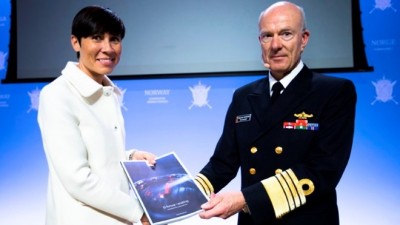Norwegian Defense Minister Ine Erikesen Søreide is proposing some major cuts in defense spending that will eliminate more than 1,500 jobs and shut down nine military bases. The army will be hit the hardest.

The proposed cuts, reported Wednesday night by newspaper Dagens Næringsliv (DN), come after Norway’s Conservatives-led government coalition had promised to boost defense budgets to in turn increase Norway’s contribution to NATO. The cuts now proposed are aimed at “rationalizing” and making military operations more efficient.
DN reported that Søreide has support for her defense plan within the government, but it probably won’t be sent over to Parliament until mid-June. The proposal come just as serious questions have been raised about the state of Norway’s defense.
Eriksen’s professional military advisers have proposed major increases in defense spending, of at least NOK 175 billion over the next 20 years. That’s the minimum needed, they argue, if Norway is to be able to defend itself in the event of attack until NATO assistance arrives and be able to carry out its duties.
DN reported that Eriksen has chosen to shield the military’s major investments including acquisition of 52 new F35 fighter jets, new submarines and new maritime surveillance flights. Her goal reportedly is “better balance” within Norway’s defense but she wouldn’t comment on her plans in detail until they’re forwarded to the Parliament.

Sortland will also be shielded as the base for Norway’s Coast Guard, while the garrison at Sør-Varanger will be oppgraded. Otherwise a “more rational base structure” will result in the shutdown of nine military bases at Trondenes, Harstad Syd, Åsegarden, Setnesmoen, Kjeller, Andøya, Kjevik, Nærøysund and Grunden 22. Many are small but others are quite large: Andøya, for example, is to be taken over by the air base at Evenes. The Kjeller air base northeast of Oslo has been a defense installation for 100 years, but it’s no longer considered a critical facility, with Gardermoen located nearby. The number of Army music corps will also be reduced, DN reported, and the Army’s 2nd Batallion, stationed at Skjold with 700 troops, will also be shut down. A new company will be formed to send to northern areas, to strengthen border patrol.
Of the more than 1,500 positions on the chopping block, around 1,100 are military personnel and 450 are civilians. Plans call for generous severance packages of 36 months’ pay but the cuts will still result in net savings of NOK 2.4 billion over four years and NOK 23 billion over 20 years.

Local communities are bound to protest, because of the pending losses of both jobs and military spending. Norwegian military operations have often functioned as part of the country’s political support for outlying areas, to keep them populated and fuel local economies with defense spending. Resources arguably have been spread too far, though, and Eriksen wants to streamline.
The Air Force’s Sea King rescue helicopters will be upgraded and overall military budgets will be boosted, by NOK 14 billion by 2020.
Eriksen remained mostly mum on the proposed streamlining, but told DN that “we will make a considerable investment in the military in the upcoming long-gterm planning period.” She cited a long period of neglect regarding operations and maintenance “that we inherited from the former government,” and stressed a need “for a defense apparatus with a solid structure financed in a sustainable manner. Given the security situation at present, that demands considerable investment.”
Labour unions representing military officers and personnel were quick to criticize the plan. “The government’s proposal is dramatic and will result in further reductions of our defense ability,” Egil Andre Aas of the Norwegian officers’ organization Norges Offisersforbund. Jens Jahren of another officers’ organization BFO (Befalets Fellesorganisasjon) warned that the defense portion of Norway’s gross national product will sink.
Opposition politicians were also critical, with Liv Signe Navarsete of the rural-oriented Center Party claiming that Eriksen must not have received support in the government for earlier plans to significantly boost military spending. “For all of us who have followed the defense minister’s promises when she sat in opposition, this is a huge belly-flop,” Navarsete told DN. Eriksen had no comment.
newsinenglish.no/Nina Berglund

